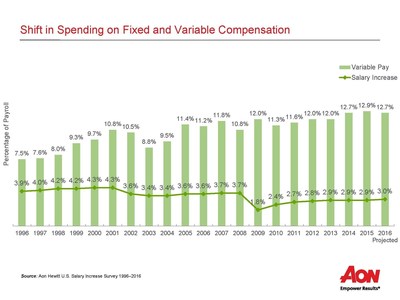U.S. Organizations Report Highest Compensation Spend in 39 Years
OREANDA-NEWS. August 27, 2015. Research from Aon Hewitt, the global talent, retirement and health solutions business of Aon plc (NYSE: AON), shows total compensation and spending for U.S. employees reached a record high of 15.8 percent in 2015, with the majority of funds allocated toward variable pay, such as incentives, bonuses and cash awards.
According to Aon Hewitt's 2015 U.S. Salary Increase Survey of 1,214 organizations, salaried exempt workers will see base pay rise by 2.9 percent and variable pay increase by 12.9 percent in 2015. By comparison, total compensation and spending budgets for salaried exempt employees was 11.4 percent in 1996, with 3.9 percent accounting for salary and 7.5 percent accounting for bonuses.
"Organizations are under immense pressure to keep costs in line to remain competitive, and as a result, we are seeing more than 90 percent of companies shifting more of their spending to variable pay because this type of strategy enables them to recognize and reward performance without growing their fixed cost," said Ken Abosch, broad-based compensation practice leader, Aon Hewitt. "Pay is a top engagement driver for employees, and as the market continues to improve, organizations will need to differentiate through variable pay programs to attract and retain top talent."

Base Pay Increases
Aon Hewitt's survey projects that pay increases will continue to modestly increase in 2016. Pay increases for salaried exempt employees are expected to be 3.0 percent up from 2.9 percent in 2015, but nearly a full percentage point lower than what was observed two decades ago.
"The modest increases we've seen over the past 20 years are an indication that employers have changed their compensation strategies for good, and we shouldn't expect to see salary increases revert back to 4 percent or higher levels that were commonplace in the past," said Abosch.
2016 Salary Increase and Variable Pay Projections by City
According to Aon Hewitt's survey, workers in some U.S. cities can expect to see salary increases higher than the national average in 2016. These cities include Washington, D.C. (3.8 percent), Dallas (3.5 percent), Minneapolis (3.3 percent), and Columbus, Houston and Seattle (3.2 percent). Salary increases in 2016 are expected to be lower than national average in Kansas City (2.7 percent), Rochester (2.9 percent) and Philadelphia and Charlotte (2.8 percent).
Similar to the national average, projected pay spend on variable pay for 2016 shows record highs, particularly in Houston (16.5 percent), Boston (16.1 percent) and Minneapolis (13.0 percent).
Salary Increases by Industry
Industries likely to see the highest salary increases in 2016 include telecommunications (3.4 percent); mining/milling (3.4 percent); insurance (3.2 percent) and automotive (3.2 percent). Industries with the lowest increases are projected to be energy (2.4 percent); education (2.5 percent); health care (2.6 percent); and forest and paper products/packaging (2.6 percent).
"The level of rewards that industries are able to offer employees vary widely and are typically based on competitive pressures and company performance," said Abosch. "For example, companies in the automotive industry are better positioned to offer above average salary increases because of growing consumer demand and recent manufacturing efficiencies and productivity improvements. On the other hand, organizations in the energy sector have been seriously impacted by the falling cost of oil and are therefore forced to keep fixed costs at a minimum."
About the Survey
Aon Hewitt's 2015 U.S. Salary Increase Survey represents the 39th annual study focusing on overall changes in employee compensation for the calendar year 2015 and current projections for 2016. Information was collected during June and July. Visit globalcompensation.net for more information.




Комментарии